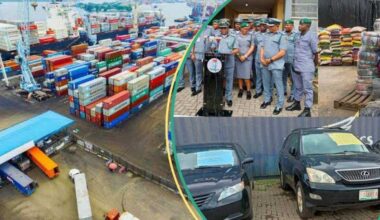The ban on new petrol and diesel cars will be reinstated to 2030, This is Money and Mail Online Motoring can exclusively reveal.
Despite no mention in the King’s Speech, the new Labour government’s much anticipated restoring of the 2030 transition to electric vehicles is coming, with the Department for Transport saying there will be ‘more details in due course’.
Industry insiders have told us that they’ve received similar written confirmation from the Office for Zero Emission Vehicles (OZEV), who have also vowed to ‘accelerate the rollout of chargepoints’.

Labour has confirmed that its proposed reinstating of the 2030 ban on new petrol and diesel cars will go ahead

The 2030 deadline will see a further push towards electric vehicles and net zero
Labour heavily ran with bringing the ban on new internal combustion cars forward to 2030 as part of its general election manifesto, after Rishi Sunak had pushed it back to 2035 last year.
An announcement was expected in the King’s Speech on 17 July, yet no mention was made.
But now a Department for Transport spokesperson has officially confirmed to us that the acceleration of the deadline will go ahead.
‘We’re committed to delivering greener transport by supporting the transition to electric vehicles,’ they said.
‘This includes phasing out the sale of new petrol and diesel cars by 2030 and accelerating the rollout of charge points. We will set out more details in due course.’
This echoes what industry stakeholders have recently been told.
One insider confirmed to This is Money that, after asking for clarity from the Office for OZEV, they were informed: ‘As set out in the manifesto, the Government will restore the phase-out date of 2030 for new cars with internal combustion engines and will accelerate the roll out of chargepoints.’
Further information was omitted, with ‘more details on both to be released in due course’.
Whether this deadline will extend to mild hybrid and plug-in hybrid electric vehicles (PHEV) and ICE vans has yet to be affirmed.

Labour promised in the run up to the election to set new binding targets for the EV charging point rollout
What will this mean for manufacturers and industry?
Despite the flip-flopping on the deadline for the end of sales of new internal combustion engine cars, many manufacturers will likely be relieved to see the original date restored.
Car makers have for some time been planning for – and investing in – this timeline for years behind the scenes.
Earlier this month Matt Galvin, UK managing director of Swedish EV brand Polestar commented on how the 2030 ban impacts EV manufacturers.
He told This is Money: ‘With the recent change in government, there’s now a proposal to reverse the decision to delay the transition to pure electric vehicles from 2030 to 2035; a U-turn on the U-turn. What vehicle manufacturers need is certainty to support product lifecycle planning.
‘While we welcome a faster transition to zero tailpipe emissions, combating poor air quality and delivering on the UK climate change ambitions, it requires an urgent focus on the imbalance between incentives to stimulate private consumer demand and penalties for the manufacturers.
‘Policymakers to date have focused solely on punitive measures rather than offering much needed incentives; all sticks, no carrots.’

Electric future: The ZEV mandate will force car makers to sell an increasing volume of EVs between now and 2035

Guy Pigounakis, commercial director of MG UK, says the acceleration of the ban on sales of new petrol and diesel cars means the Zero Emission Vehicle (ZEV) Mandate would likely be scrapped and with it a ‘huge sigh of relief from most manufacturers’
The moving of the goalposts for the ban on sales of new petrol and diesel cars will ultimately mean the Zero Emission Vehicle (ZEV) Mandate – introduced only this year – will need to be adjusted or scrapped entirely.
Introduced to law in January, it requires car makers to sell an increase share of EVs each year up to the previous deadline of 2035.
In 2024, a minimum of 22 per cent of mainstream brands’ sales are required to be zero-emission cars.
The threshold increases to 28 per cent next year and to 80 per cent by 2030 – and eventually reaching 100 per cent by 2035.
Failure to meet these binding targets would result in costly fines for manufacturers.
Guy Pigounakis, commercial director at MG Motor UK told us: ‘The views of manufacturers will be polarised’ because 2030 will almost certainly remove the ZEV mandate sales requirements manufacturers are currently having to meet.
‘If 2030 is a drop-dead date [ZEV targets abolished for a blanket ban on new ICE cars and vans], there’d be a huge sigh of relief from most manufacturers.
‘I personally don’t believe that it would slow down the transition of manufacturers into building EVs because you don’t decide to build EVs overnight.
‘The problem with the ZEV mandate is the speed at which those volumes come in have left the industry gasping […] but it’s a big step for the government to say, ‘we trust the industry to make that transition’ and leave alone.’
What will it mean for motorists?
In 2018, when the Government was offering £3,500 towards the cost of a new EV via the Plug-in Car Grant, the majority of motorists still couldn’t afford to buy one.
A poll of 2,000 drivers carried out by Compare the Market six years ago found that 44 per cent (the equivalent of 16million licenced drivers) claimed they wouldn’t have the necessary funds to purchase the latest electric cars even with subsidies available.
The grant scheme was closed in 2022, however, the price of new EVs has fallen – and dramatically so in 2024 with the introduction of the first of a wave of cheap EVs.
Dacia’s Spring has become Britain’s cheapest battery car starting from £14,995 and it will face competition from the new £21,990 Citroen e-C3 launching later this year.
From next spring, customers will also be able to get their hands on the sub-£22,000 Hyundai Inster and, by 2026, Volkswagen’s ID.2 should be on sale also with a near-£20k price tag.

When does an EV become better value for money than an equivalent petrol model? This is Money compare depreciation of like-for-like cars to discover when an electric vehicle will be kinder to your bank account. Take a look at our side by side comparisons here
And it’s not just the price of new EVs that are in decline.
Valuations specialists Cap Hpi have found average retail prices for EVs are 8.5 per cent cheaper than petrol at the three-year mark, rising to almost double that by year four.
In the meantime, used EV sales rose by more than 50 per cent between April and June of this year compared to the same period in 2023.
However when the Conservatives originally moved the goal post back, there were warnings that clarity, incentives and price parity with ICE are vital for a smooth transition.
SMMT chief executive, Mike Hawes said: ‘To make this a reality, however, consumers must want to make the switch, which requires from Government a clear, consistent message, attractive incentives and charging infrastructure that gives confidence rather than anxiety.
‘Confusion and uncertainty will only hold them back.’

The DfT, have vowed to ‘accelerate the rollout of chargepoints’ alongside reinstating the 2030 deadline
Labour’s 2030 EV promise – what was in the manifesto? What can industry and public expect?
The key motoring pledge was to give certainty to manufacturers by restoring the 2023 phase-out of new petrol and diesel cars and increasing chargepoint provision.
In its automotive plan Labour addressed EVs saying it would:
- Set new binding targets for EV charging point rollout
- Release and redirect the existing £950 million Rapid Charging Fund announced in 2020
- Remove planning barriers to chargepoint rollout such as rapid charger height restrictions
- Make chargepoint data open access
- Introduce Electric Vehicle Confident labelling requirement on new EVs, similar to the Monroney sticker used in the US
- Establish an international buyers’ club for critical minerals and interconnectors, and cross-government oversight on end-of-life batteries
- Invest £1.5 billion in new gigafactories ‘so our automotive industry leads the world’
How is the UK’s chargepoint roll out currently shaping up?
The latest quarterly report from the Department for Transport and charging point platform ZapMap shows a total of 64,632 EV charging devices open to the public as of 1 July.
The UK has a target of 300,000 chargepoints to install by 2030.
While we’ve seen an 8 per cent increase in installations in the last three months, with 4,962 new chargepoints added to the network since April 1 2024, the UK is still tracking below target levels with 2,800 devices needed per month to meet the 300,000 promised by the end of the decade.
Why did the Conservatives delay 2030 to 2035?
He cited financial worries for Britons as the reason saying: ‘I expect that by 2030 that the vast majority of cars sold will be electric. Why? Because the costs are reducing, the range is improving, the charging infrastructure is growing.
‘People are already choosing electric vehicles to such an extent that we’re registering a new one every 60 seconds.
‘But I also think that, at least for now, it should be you, the consumer, that makes that choice, not government forcing you to do it.
‘Because the upfront cost still is high, especially for families struggling with the cost of living. Small businesses are worried about the practicalities. And we’re got further to go to get the charging infrastructure truly nationwide.’
Last year’s push back to 2035 left much of the industry frustrated.
Lisa Brankin, Ford UK chair, told us: ‘Our business needs three things from the UK government: ambition, commitment and consistency. A relaxation of 2030 would undermine all three.’

Lisa Brankin of Ford UK said the car firm had invested millions into its development and manufacturing facilities to meet the 2030 timeframe
The Volkswagen Group also spoke out on the delay.
It said via an official statement: ‘We need the policy focus trained on bolstering the EV market in the short term and supporting consumers while headwinds are strong: infrastructure remains immature, tariffs loom and cost-of-living is high.
‘We urgently need a clear and reliable regulatory framework which creates market certainty and consumer confidence.
‘Binding targets for infrastructure rollout and incentives are required to ensure the direction of travel.’
Sue Robinson chief executive of the National Franchised Dealers Association (NFDA), which represents car and commercial retailers across the UK, said Mr Sunak’s decision is ‘unsurprising’ and warned the change in policy will ‘likely create further uncertainty for the industry’.
However, she added that the move to 2035 now aligns the UK automotive industry with the EU, its ‘largest international trading partner, and automotive dealers support this’.
Some links in this article may be affiliate links. If you click on them we may earn a small commission. That helps us fund This Is Money, and keep it free to use. We do not write articles to promote products. We do not allow any commercial relationship to affect our editorial independence.
Source link







